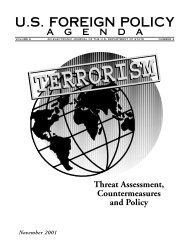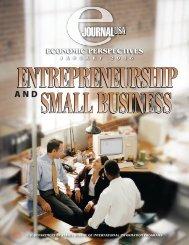s. history us history us history - Embassy of the United States
s. history us history us history - Embassy of the United States
s. history us history us history - Embassy of the United States
- No tags were found...
You also want an ePaper? Increase the reach of your titles
YUMPU automatically turns print PDFs into web optimized ePapers that Google loves.
CHAPTER 3: THE ROAD TO INDEPENDENCEOUTLINE OF U.S. HISTORYcolonies to provide royal troops withprovisions and barracks.THE STAMP ACTA general tax measure sparked<strong>the</strong> greatest organized resistance.Known as <strong>the</strong> “Stamp Act,” it requiredall newspapers, broadsides,pamphlets, licenses, leases, and o<strong>the</strong>rlegal documents to bear revenuestamps. The proceeds, collected byAmerican c<strong>us</strong>toms agents, would be<strong>us</strong>ed for “defending, protecting, andsecuring” <strong>the</strong> colonies.Bearing equally on people whodid any kind <strong>of</strong> b<strong>us</strong>iness, <strong>the</strong> StampAct aro<strong>us</strong>ed <strong>the</strong> hostility <strong>of</strong> <strong>the</strong> mostpowerful and articulate groups in<strong>the</strong> American population: journalists,lawyers, clergymen, merchantsand b<strong>us</strong>inessmen, North and South,East and West. Leading merchantsorganized for resistance and formednonimportation associations.Trade with <strong>the</strong> mo<strong>the</strong>r countryfell <strong>of</strong>f sharply in <strong>the</strong> summer <strong>of</strong>1765, as prominent men organized<strong>the</strong>mselves into <strong>the</strong> “Sons <strong>of</strong> Liberty”— secret organizations formedto protest <strong>the</strong> Stamp Act, <strong>of</strong>tenthrough violent means. From Massach<strong>us</strong>ettsto South Carolina, mobs,forcing luckless c<strong>us</strong>toms agents toresign <strong>the</strong>ir <strong>of</strong>fices, destroyed <strong>the</strong>hated stamps. Militant resistance effectivelynullified <strong>the</strong> Act.Spurred by delegate Patrick Henry,<strong>the</strong> Virginia Ho<strong>us</strong>e <strong>of</strong> Burgessespassed a set <strong>of</strong> resolutions in Maydenouncing taxation without representationas a threat to colonialliberties. It asserted that Virginians,enjoying <strong>the</strong> rights <strong>of</strong> Englishmen,could be taxed only by <strong>the</strong>ir ownrepresentatives. The Massach<strong>us</strong>ettsAssembly invited all <strong>the</strong> colonies toappoint delegates to a “Stamp ActCongress” in New York, held in October1765, to consider appeals forrelief to <strong>the</strong> Crown and Parliament.Twenty-seven representatives fromnine colonies seized <strong>the</strong> opportunityto mobilize colonial opinion. Aftermuch debate, <strong>the</strong> congress adopted aset <strong>of</strong> resolutions asserting that “notaxes ever have been or can be constitutionallyimposed on <strong>the</strong>m, butby <strong>the</strong>ir respective legislatures,” andthat <strong>the</strong> Stamp Act had a “manifesttendency to subvert <strong>the</strong> rights andliberties <strong>of</strong> <strong>the</strong> colonists.”TAXATION WITHOUTREPRESENTATIONThe issue th<strong>us</strong> drawn centered on<strong>the</strong> question <strong>of</strong> representation. Thecolonists believed <strong>the</strong>y could notbe represented unless <strong>the</strong>y actuallyelected members to <strong>the</strong> Ho<strong>us</strong>e <strong>of</strong>Commons. But this idea conflictedwith <strong>the</strong> English principle <strong>of</strong> “virtualrepresentation,” according to whicheach member <strong>of</strong> Parliament represented<strong>the</strong> interests <strong>of</strong> <strong>the</strong> wholecountry and <strong>the</strong> empire — even ifhis electoral base consisted <strong>of</strong> onlya tiny minority <strong>of</strong> property ownersfrom a given district. This <strong>the</strong>oryassumed that all British subjectsshared <strong>the</strong> same interests as <strong>the</strong>property owners who elected members<strong>of</strong> Parliament.The American leaders arguedthat <strong>the</strong>ir only legal relations werewith <strong>the</strong> Crown. It was <strong>the</strong> king whohad agreed to establish colonies beyond<strong>the</strong> sea and <strong>the</strong> king who provided<strong>the</strong>m with governments. Theyasserted that he was equally a king <strong>of</strong>England and a king <strong>of</strong> <strong>the</strong> colonies,but <strong>the</strong>y insisted that <strong>the</strong> EnglishParliament had no more right topass laws for <strong>the</strong> colonies than anycolonial legislature had <strong>the</strong> right topass laws for England. In fact, however,<strong>the</strong>ir struggle was equally withKing George III and Parliament.Factions aligned with <strong>the</strong> Crowngenerally controlled Parliament andreflected <strong>the</strong> king’s determination tobe a strong monarch.The British Parliament rejected<strong>the</strong> colonial contentions. Britishmerchants, however, feeling <strong>the</strong> effects<strong>of</strong> <strong>the</strong> American boycott, threw<strong>the</strong>ir weight behind a repeal movement.In 1766 Parliament yielded,repealing <strong>the</strong> Stamp Act and modifying<strong>the</strong> Sugar Act. However, tomollify <strong>the</strong> supporters <strong>of</strong> centralcontrol over <strong>the</strong> colonies, Parliamentfollowed <strong>the</strong>se actions with passage<strong>of</strong> <strong>the</strong> Declaratory Act, which asserted<strong>the</strong> authority <strong>of</strong> Parliament tomake laws binding <strong>the</strong> colonies “inall cases whatsoever.” The colonistshad won only a temporary respitefrom an impending crisis.THE TOWNSHEND ACTSThe year 1767 brought ano<strong>the</strong>rseries <strong>of</strong> measures that stirred anewall <strong>the</strong> elements <strong>of</strong> discord. CharlesTownshend, British chancellor <strong>of</strong> <strong>the</strong>exchequer, attempted a new fiscalprogram in <strong>the</strong> face <strong>of</strong> continueddiscontent over high taxes at home.Intent upon reducing British taxesby making more efficient <strong>the</strong> collection<strong>of</strong> duties levied on Americantrade, he tightened c<strong>us</strong>toms administrationand enacted duties on colonialimports <strong>of</strong> paper, glass, lead, andtea from Britain. The “TownshendActs” were based on <strong>the</strong> premise thattaxes imposed on goods imported by<strong>the</strong> colonies were legal while internaltaxes (like <strong>the</strong> Stamp Act) were not.The Townshend Acts were designedto raise revenue that wouldbe <strong>us</strong>ed in part to support colonial<strong>of</strong>ficials and maintain <strong>the</strong> Britisharmy in America. In response,Philadelphia lawyer John Dickinson,in Letters <strong>of</strong> a Pennsylvania Farmer,argued that Parliament had <strong>the</strong>right to control imperial commercebut did not have <strong>the</strong> right to tax <strong>the</strong>colonies, whe<strong>the</strong>r <strong>the</strong> duties wereexternal or internal.The agitation following enactment<strong>of</strong> <strong>the</strong> Townshend duties wasless violent than that stirred by <strong>the</strong>Stamp Act, but it was never<strong>the</strong>lessstrong, particularly in <strong>the</strong> cities <strong>of</strong><strong>the</strong> Eastern seaboard. Merchantsonce again resorted to non-importationagreements, and people madedo with local products. Colonists,for example, dressed in homespunclothing and found substitutes fortea. They <strong>us</strong>ed homemade paperand <strong>the</strong>ir ho<strong>us</strong>es went unpainted.In Boston, enforcement <strong>of</strong> <strong>the</strong>new regulations provoked violence.5455












